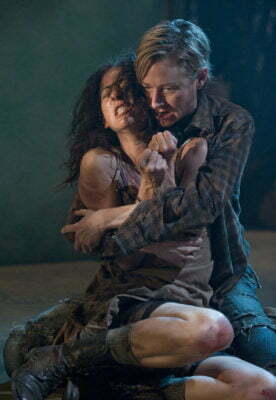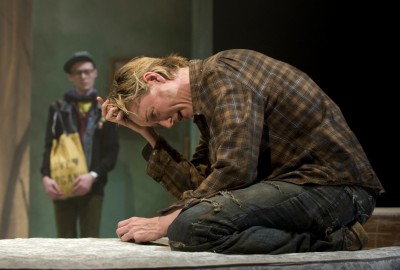Pony
By Sylvan Oswald
Directed by Bonnie Metzgar
Produced by About Face Theatre
At the Chopin Theatre
This love is different because it’s ours
As part of The Woyzeck Project, Pony is a new play (this is its world premiere) that uses Woyzeck as a jumping-off point to explore new issues and connections. The brutal murder that concludes Büchner’s play has just recently occurred (in a contemporary setting), and in a town on the other side of the woods, a stranger arrives in town. His name is Pony, and he isn’t very open about himself; but he (like the title character in Büchner’s play) is taking part in a medical experiment, and has weekly sessions with Cav. He also starts a romance with Marie, who shares a name with the murdered woman. Her best friend, Stell, is in love with her, and another newbie in town, Heath, asks Stell to help him look for a “father-figure.”
Pony, who is played by the vibrant Kelli Simpkins, is a transgender man – that is, a female, by sex, who identifies as a man[1] – who moved to this town in order to “pass” as a man. He’s looking for a fresh start. But, society being what it is, he feels hedged-in on all sides. And yet, although this play’s title role is transgendered, and virtually everyone in it is queer, this isn’t exactly “queer theatre.” It is, in a sense: in a way, this play is about three generations of transgendered individuals. Cav (the stand-out Janet Ulrich Brooks) is older, a butch lesbian who never attempted to pass for a man; Pony is younger, but still an adult, and he considers himself a man even though he is still physically female; and Heath is a kid, maybe still a teenager, who’s gone through an operation to become male. Yes, this is a play about three generations of transgendered people, how things have changed, and how there is hope for them in the future, hope that they will at some point be considered “normal.” But to say the play is just about that, is simply incorrect. The play is about madness, desperation, trying to discover what makes a man kill another human being. It’s about love and hope and despair and everything a play should be about.
So it’s not a one-issue play. That said, it’s not an especially good play, either. The author combines dirty, low-to-the-ground, gritty language with flowery metaphors and far-reaching similes. And if the play has you early on, you go along when it has lines like, “A good murder, a true murder, a beautiful murder, so beautiful as one can only ask to do, we’ve had none for so long.” (That’s a rough approximation from the German, I couldn’t remember the exact sentence used in Hypocrites’ Woyzeck.) But Pony doesn’t quite manage to do that. It’s ambitious, to be sure, and its use of the German play – and its pairing with Hypocrites’ production, which takes place on the same stage and from which sound clips are used, dubbed over this play – is well-thought-out and careful. But I found Marie’s character, even when played by the fantastic Kristina Valada-Viars, to be a rather unappealing basket case. She’s the one “straight” character in the play (or at least claims to be, saying she has a boyfriend), but she’s also the least mentally stable. Now, I don’t think that’s a statement; her instability is one of the major catalysts of the play, and the lines between straight and queer blur as she gets more involved with Pony. But her actions want to be deeper than they are. She is seeking what makes a person driven to murder, and is fascinated with the recent murder in particular, not just because she shares her name with the dead woman. But in pursuit of this, she frequently holds up a mirror and draws her arm back, as if holding a knife, and grimaces as herself. It’s odd, because I feel like it could be a really intriguing motif, but in this case it just falls flat. Which is how I feel about this play overall: there are plenty of elements that seem like they should be better than they are, but for some reason, they just don’t work (e.g. the language, mentioned above).
Jessica Hudson is strong as Stell; but Matthew Sherbach seems miscast as Heath. His Heath is a scrawny, effeminate, wisp of a kid and an ultra-hipster, not exactly a person you’d think of as someone who’s gone through sex reassignment therapy. Which might be kind of the point, but he sort of comes off as gay. That said, he’s a fine actor, and does a good job with this role, with the above caveat.
So, ultimately, the acting is strong, the direction, lighting, production, all good. But the play itself is only mediocre.
Somewhat recommended
Will Fink
Reviewed on 4.24.11
[1] Male & Female = Sex; Man & Woman = Gender. Sex is biological, gender is societal.



